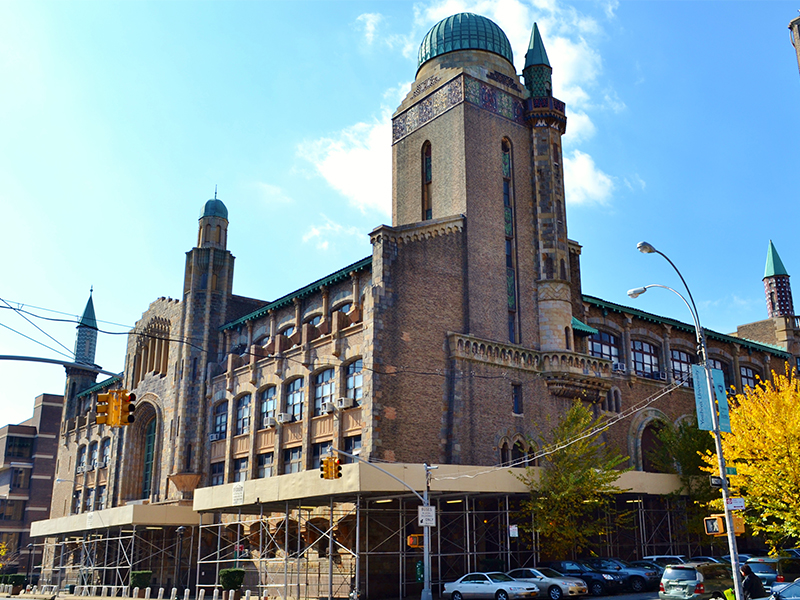SCOTUS
Yeshiva University is forced to accept an LGBTQ clubBut it’s unclear for how long.

David H. Zysman Hall at Yeshiva University in New York City,
taken on Oct. 25, 2014. Photo by Gigi Altarejos/Creative Commons
September 15, 2022
(RNS) — The U.S. Supreme Court surprised some observers Wednesday (Sept. 14) by deciding by a 5-4 vote against issuing an injunction against a New York state judge’s ruling that Yeshiva University, an Orthodox Jewish school in Manhattan, must recognize an LGBTQ club on campus.
With conservative Justices John Roberts and Brett Kavanaugh joining the court’s three liberals, does this signal that there’s now a majority on the court for allowing anti-discrimination laws to trump religious liberty in certain cases?
Probably not.
In all likelihood, the decision reflected concern — expressed publicly by Roberts and Elena Kagan of late — about the court’s so-called shadow docket, an increasingly frequent mode of ruling, in which cases are dealt with outside normal procedure. Here, an unsigned majority opinion told the university to go back and seek injunctive relief from New York’s own appellate courts, and made clear that the review should be “expedited.”
RELATED: SCOTUS says Yeshiva University must recognize LGBTQ club as legal battle continues
If the state courts decline to intervene, Yeshiva would then be able to appeal to the Supremes, who could issue an injunction — if they agree to take the case. That they would do so is the safest of bets, since four justices wanted to issue an injunction right now, and to take a case four is all you need.
Writing for the four dissenters, Justice Samuel Alito claimed that being made to recognize the club, the YU Pride Alliance, would require Yeshiva to accept an interpretation of Torah that the university finds unacceptable, and that it would consequently be deprived of its free exercise of religion. “The loss of First Amendment rights for even a short period constitutes irreparable harm,” he wrote, a necessary standard that justifies injunctive relief.
Whether that’s the case is debatable. New York Judge Lynn Kotler wrote in her June decision at trial, “By following the law and granting the YU Pride Alliance formal recognition and equal access, Yeshiva need not make a statement endorsing a particular viewpoint.”
Moreover, Kotler pointed out, LGBTQ clubs have existed in a number of Yeshiva graduate schools for more than 30 years, quoting an explanation contained in a 1995 letter by the university’s public relations director:
Yeshiva University is subject to the human rights ordinance of the City of New York, which provides protected status to homosexuals. Under this law, YU cannot ban gay student clubs. It must make facilities available to them in the same manner as it does for other student groups.
The YU Pride Alliance may be seeking more in the way of recognized status than these other clubs. Nevertheless, it seems a stretch to judge the university to be suffering irreparable harm while it seeks judicial redress, denying all the while that it accepts the Pride Alliance’s interpretation of Torah.
Be that as it may, Yeshiva’s central legal hurdle is the result of its choosing, back in the 1960s, to redefine itself legally as a purely educational rather than a religious organization. It thus made itself ineligible for an exemption from the anti-discrimination rules of New York City’s Human Rights Law.
If and when the justices get the case back, there’s nothing that says they couldn’t decide that the university’s religious claims outweigh its official status in New York law. Indeed, Kotler herself acknowledged Yeshiva’s “proud and rich Jewish heritage and a self-described mission to combine ‘the spirit of Torah’ with strong secular studies.”
Should that be sufficient reason to ignore its actual legal status as a college and not a religious institution? And, if so, are there any grounds for rejecting any institution’s sincerely held religious claims to exemptions from anti-discrimination laws? If there are, the Supreme Court as currently configured has yet to articulate them.
No comments:
Post a Comment